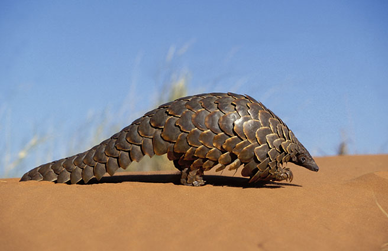only magazine
↵ home
Appetite For Destruction

By Alan Hindle
Monday June 18, 2007
with your choice of noodles or rice
The Guardian is reporting that an abandoned freight ship was discovered near Qingzhou Island off the coast of China containing approximately 5,000 animals, all endangered species, which were on their way to dinner tables in Guangdong. The boat’s engines had died and the crew had left, leaving pangolins, leatherback turtles, monitor lizards and other animals crushed into 200 wooden crates. Despite being starved, dehydrated and smothered amongst themselves for days, many animals were still alive. Presumably, or perhaps hopefully, not still alive were the bears whose paws were found cut off and wrapped in newspaper like fish and chips.
Such animals are considered a delicacy in China, and many are used as medicine. For example, the pangolins have their scales stripped off so women can rub them on their nipples to help breastfeeding.
The chef at one restaurant which illegally serves the illegal meat to criminal customers describes the preferred, criminal method for cooking (illegally) a pangolin: “We keep them alive in cages until the customer makes an order. Then we hammer them unconscious, cut their throats and drain the blood. It is a slow death. We then boil them to remove the scales. We cut the meat into small pieces and use it to make a number of dishes, including braised meat and soup. Usually the customers take the blood home with them afterwards.”
Rob Stewart’s beautifully shot but worrying film Sharkwater presented the shark, a much misunderstood and maligned animal, which has shaped the world’s oceans for hundreds of millions of years, as being put on the verge of extinction. Every year thousands upon thousands of sharks are stripped of their fins and left to sink helplessly to the bottom of the sea to die. The completely flavourless fins wind up in soup because of a superstitious belief that sharks are immune to disease, and therefore eating their fins will ward off cancer and tumours. At the 43rd Annual American Society of Clinical Oncology, Dr. Charles Lu of the University of Texas MD Anderson Cancer Center declared after a great deal of study that this was ‘hoggledywash’. That’s not a quote, and the word is made up, but the meaning intended is the same. Not only did shark cartilage, also known as AE-941 and Neovastat, not provide any effective treatment for cancer and tumour patients, but also statistically was less effective than the placeboes given to control subjects.
In other words, you are better off stuffing gourmet jellybeans in your face and believing they’re good for you than being given Neovastat. Watermelon-flavoured jellybeans, in fact, are probably also more effective rubbed on your nipples for producing milk than pangolin scales because at least they don’t have sharp edges that can cut. The worst that can happen is you wind up with sticky nips.
The American Century has ended. The Chinese Century is about to begin. At about the midway point, bistros in Guangdong will have to figure out a way to make superstitious snacks out of dirt. At this rate, that’s all that’s going to be left in the world.
